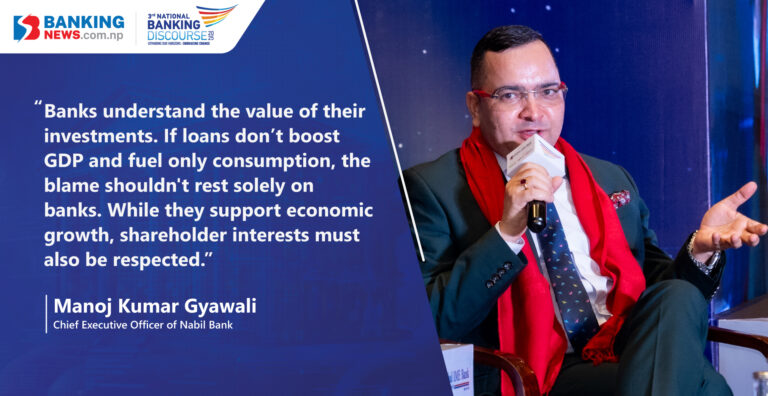Kathmandu – Manoj Kumar Gyawali, Chief Executive Officer of Nabil Bank, stated that banks in Nepal are always ready to help drive the nation’s economic activities. Speaking during the first session of the “National Banking Discourse 2025” under the theme “Challenges in Credit Expansion in Nepal: Targeted Interventions, Sectoral Adaptation, and Emerging Possibilities,” CEO Gyawali emphasized the evolving and proactive role of banks.
He explained that Nabil Bank, once focused primarily on corporate banking, has now become an institution that serves all citizens and has significantly expanded its branch network across the country. “What used to be a corporate-focused bank is now serving the general population,” he said. He also pointed out that approximately 18% of bank loans go to consumption, 8% into real estate, and a significant portion is also directed toward agriculture. However, he stressed the importance of evaluating the actual utilization and impact of such loans.
Gyawali highlighted that banks carefully assess all sectors before disbursing loans. When it comes to areas that support the state’s development, he noted that Nabil Bank has maintained a leadership position in financing hydropower. While the average banking sector portfolio in the energy sector is around 8%, Nabil Bank’s portfolio in this segment is nearing 10%. The bank has invested NPR 38 billion in power generation and has strong involvement in tourism and hotel infrastructure as well.
He noted, “Banks are fully aware of the returns and benefits of their investments. If loans issued by banks don’t contribute to GDP or go into consumption financing, banks alone should not be blamed. While the banking sector must certainly play a role in national economic activities, we must also consider the interests of shareholders.”
Gyawali further emphasized that banks now have access in nearly every village across Nepal. “There are around 54 million bank accounts in the country,” he shared. He reiterated that banks are ready to assist in accelerating economic activity, but building national morale, effective management, and policy direction are responsibilities that lie with the government and regulatory authorities.



 About Us
About Us
Comment